|
|
| The Foundation made its first gift in December of 2008, to the Central European University, in Budapest, Hungary. This University is a beacon of light in Central Europe, attracting students from many parts of the world and preparing them to return to their countries of origin as enlightened leaders. The University was founded by George Soros, as part of his Open Society initiative.
The gift was of Individuation Journal, No. 7, The Fall of Man (1995), by Junko Chodos, shown to the right. With this donation, there are now seven of Junko's works in public collections, including museums. See her website, junkochodos.com for a complete list. |
| | 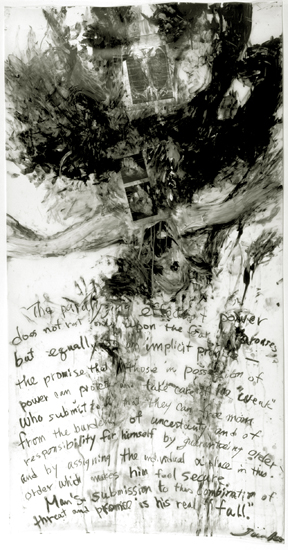 | The text on the image comes from Erich Fromm, Man for Himself, and reads in full:
The paralyzing effect of power does not rest only upon the fear it creates but equally upon the implicit promise -- the promise that those in possession of power can protect and take care of the "weak" who submit to it, that they can free man from the burden of uncertainty and of responsibility for himself by guaranteeing order and by assigning the individual a place in this order which makes him feel secure. Man's submission to this combination of threat and promise is his real fall.
|
|
| | | 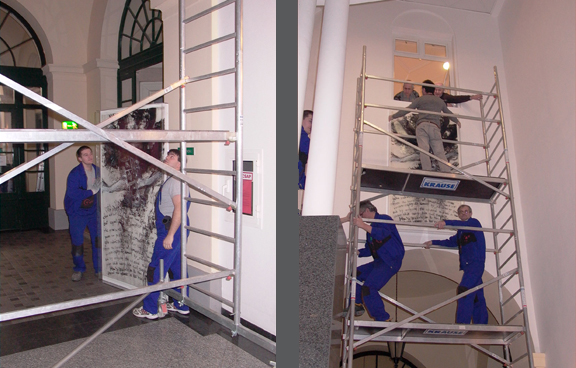 |
| | |
| Gifts to Permanent Collections |
|
Courtesy of Joseph Sasek, Director of Development at CEU, and Tara Stone, who works with him, here are photographs of the artwork being installed in the Rotunda of the Faculty Tower and below, of students reading the plaque associated with the work.
The work is framed in an acrylic box to help protect it from UV rays and other elements. As you can imagine, the box is too heavy, and too big, for one person to lift. |
| | | 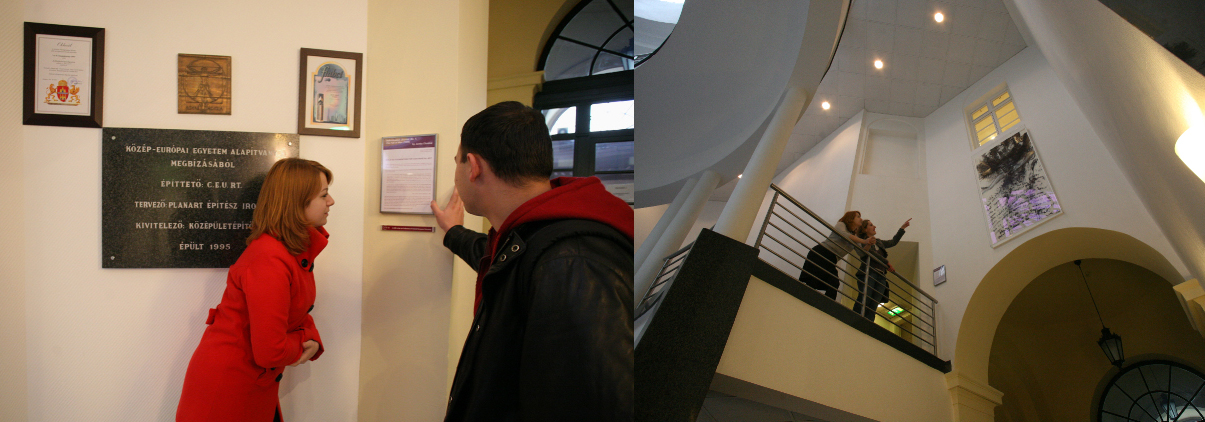 |
| | |
| The text of the plaque is here....
A human figure falls from the sky, arms outstretched, into a pile of words. The figure’s mouth and eyes are open - as if he is screaming in panic; and we can see directly into his rib cage, which is replicated lower on his body.
This is one of several works created by the artist in response to her reading of Erich Fromm. She wrote of these works:
I was a very young girl in Japan during World War II, a time of totalitarianism and fascism. The concept of individuality was considered dangerous and something to be punished by various forms of repression and progressive excommunication. When I became an adult, individuality, the struggle to become myself, became my important issue. Much later on, I came to America as a “spiritual refugee,” injured and bleeding internally from my fight for my own individuality.
In these works, I actually quoted the words of Erich Fromm, who is a psychoanalyst and philosopher, and who experienced the same kind of situation as I grew up in—only at an extreme level: Nazism. His analysis of the barriers which prevent one from being a individual became the philosophical base of my own identity as a “spiritual refugee.” These works are not an illustration of Erich Fromm’s words: they are my response to them and part of the inner dialog I hold with him. From Junko’s Series Statement, 1995
The “pile of words” comes from Man for Himself: An Inquiry into the Psychology of Ethics by Erich Fromm (An Owl Book, Henry Holt and Company, 1990, p. 246):
The paralyzing effect of power does not rest only upon the fear it arouses, but equally on an implicit promise—the promise that those in possession of power can protect and take care of the “weak” who submit to it, that they can free man from the burden of uncertainty and of responsibility for himself by guaranteeing order and by assigning the individual a place in this order which makes him feel secure. Man’s submission to this combination of threat and promise is his real “fall.”
__________________________________________________________________________________________________________________________ |
| | | MASS KILLING, NO. 1 (2009)
Gift Made August 2009
In Honor of Yehuda Elkana
In honor of Yehuda Elkana's retirement as President and Rector of CEU, Junko created the first work in her Mass Killing series, which quotes Yehuda's words originally published in an article in Ha'aretz in 1998.
Gnarled burls lie draped over an old engine block. The organic shapes of the burls contrast with the engine’s cold, mechanical structure. We might see the images in this work as a suggestion of dead bodies slaughtered in some grim house of death.
This is the first of a series of works by the artist dealing with mass killings throughout history and all over the world. She was inspired by the words of Yehuda Elkana, written in an article published in Ha’Aretz on March 2, 1998, titled “The Need to Forget:” Two kinds of people emerged from the holocaust... |
| | 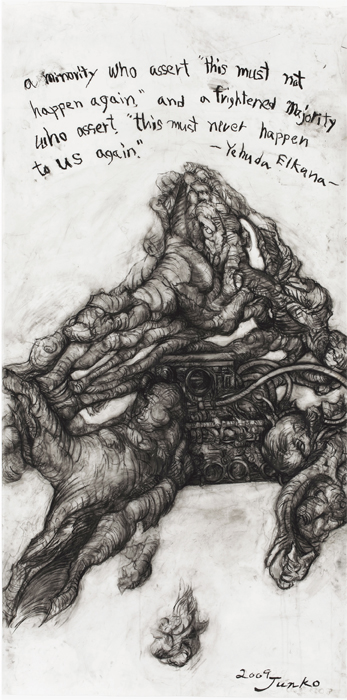 | Mass Killing, No. 1
Junko Chodos (2009)
A minority who assert, "This must never happen again"
"And a frightened majority who assert, "This must never
happen to us again."
Words by Yehuda Elkana
Charcoal on Mylar
84" x 42"
The artist writes:
Every time I read this sentence tears come to my eyes. and I finished this art work with great emotion. To experience some unbearable reality personally is one thing; to absorb it deeply into your own center in order to grasp the meaning of it is another. After that, to try to release it from the personal terrain into the terrain of wider universal significance until the power of transcendence finally comes to you—that is to go even further. These words of Prof. Elkana come from this highest stage, and they resonate with my own pain which I experienced during the war in my childhood in Japan.
And this transcendence—transforming the deepest personal experience into the most universal experience—is the essence of art. This work of mine is not intended to send a political message: it is a song of praise for the courage of those who have reached this transcendence. This is my humble declaration as I try to take one step on the long journey of changing this world into a better place.
From Junko’s Studio Diary, May 2009 |
|
| | | Mass Killing No. 1, “This Must Never Happen Again” (2009) by Junko Chodos
Charcoal and Acrylic on Mylar 84”x42” (213.36 x 106.68 cm.)
Gift of the FOUNDATION FOR CENTRIPETAL ART in Honor of Yehuda Elkana
Gnarled burls lie draped over an old engine block. The organic shapes of the burls contrast with the engine’s cold, mechanical structure. We might see the images in this work as a suggestion of dead bodies slaughtered in some grim house of death.
This is the first of a series of works by the artist dealing with mass killings throughout history and all over the world. She was inspired by the words of Yehuda Elkana, written in an article published in Ha’Aretz on March 2, 1998, titled “The Need to Forget:” Two kinds of people emerged from the holocaust: a minority who assert, “This must never happen again,” and a frightened majority who assert, “This must never happen to us again.”
|
| | | 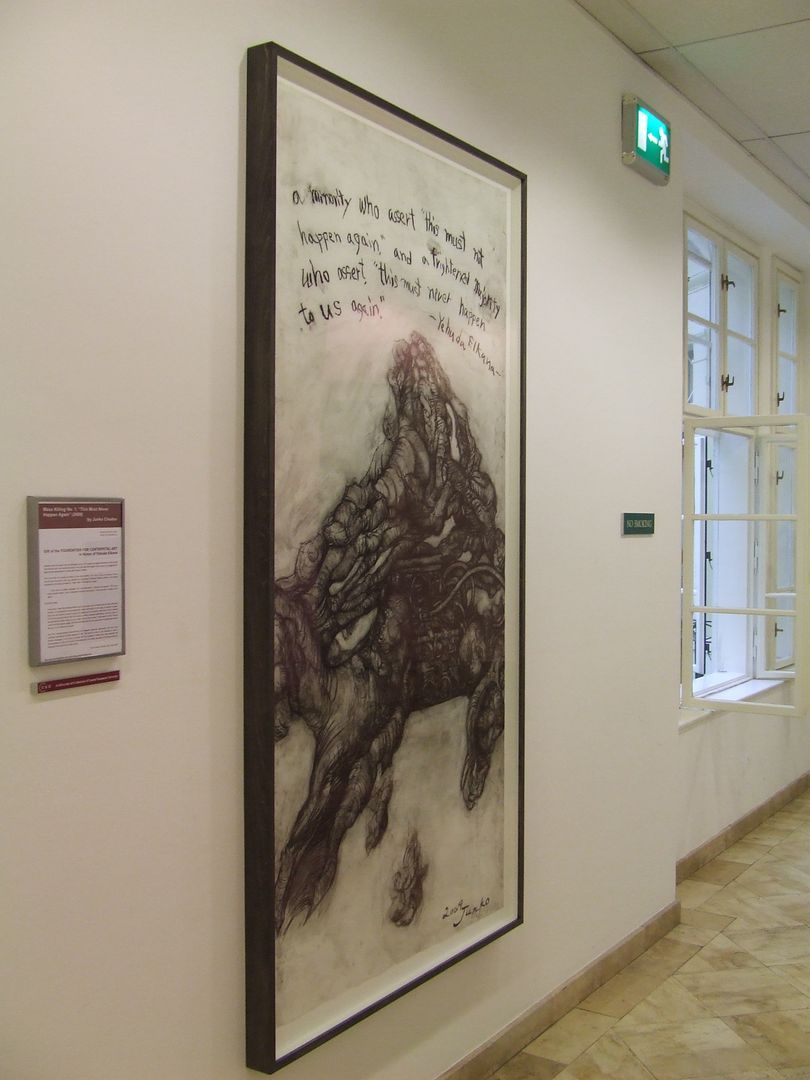 |
|
| August 2009 |
| |
| |
| |
|
|
|
|
|
|
|
|
|
|
|